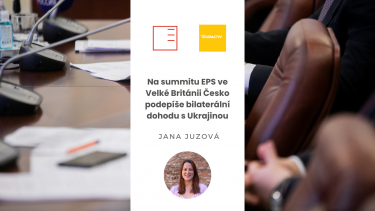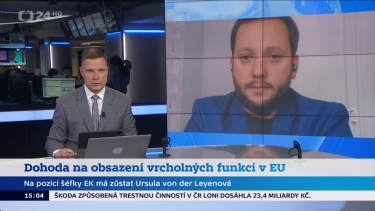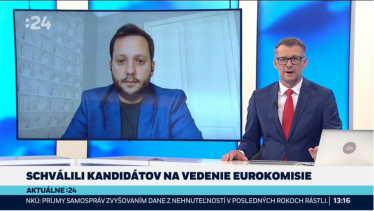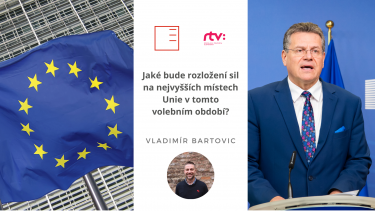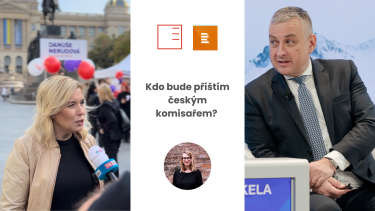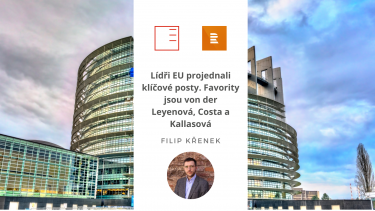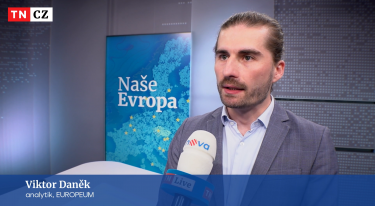ČRo Plus | Slovakia and Hungary face oil supply issues and file a complaint against Ukraine with the European Commission
Russian oil from Lukoil still isn’t flowing through Ukraine to Slovakia and Hungary. In June, Ukraine unilaterally decided to ban the transit of Lukoil oil through its territory, as the company was added to its sanctions list. Slovakia and Hungary have turned to the European Commission for help in resolving the issue. What can the EU do about this situation? What role does the Association Agreement with Ukraine play in resolving this dispute? Viktor Daněk, Deputy Director of EUROPEUM Institute, comments on the situation.
Show moreNovinky.cz | The number of migrants arriving in Europe has significantly decreased, with many heading to the Canary Islands
The European agency Frontex has released data on the number of migrants arriving in the European Union. This year, it recorded a third less migrants who have entered the Union illegally compared to last year. What are the reasons behind the decrease in migrant numbers? Did the failed agreement between the United Kingdom and Rwanda have an impact? Will the recently approved migration pact, which will come into effect in two years, also help? Viktor Daněk, Deputy Director of EUROPEUM Institute, commented on this for Novinky.cz.
Show moreEuractiv.cz | At the EPC Summit in the UK, the Czech Republic will sign a bilateral agreement with Ukraine
The United Kingdom is preparing for a major summit of the European Political Community (EPC). After the Czech Republic, Moldova, and Spain, Britain is only the fourth hosting country. Among other topics, the states will discuss Ukraine and illegal migration. On a bilateral level, the Czech Republic will sign a security agreement with Ukraine. Jana Juzová, a researcher at EUROPEUM Institute, commented on the summit for Euractiv.cz.
Show moreČT24 | Committee allocation in the European Parliament
EP groups reach a preliminary agreement on the division of committees in the new European Parliament. The strongest European People's Party Group would like to claim 7 of them, for example for foreign affairs, industry or agriculture. Listen to the comments of Viktor Daňek, Deputy Director of EUROPEUM Institute.
Show moreČT24 | Agreement on staffing of the top EU positions
Ursula von der Leyen is to continue as head of the European Commission and Kaja Kallas, the Estonian prime minister, will lead diplomacy. Both politicians have yet to be confirmed by MEPs. The leadership of the European Council, on the other hand, is already assured by former Portuguese Prime Minister António Costa. Žiga Faktor, deputy director and head of EUROPEUM Institute's Brussels office, offers his perspective.
Show more
RTVS | EU and Ukraine have concluded a comprehensive security agreement in Brussels
The European Union and Ukraine concluded a comprehensive security agreement in Brussels. This builds upon the EU's longstanding support for Ukraine. What did the politicians agree upon? What is new in the new treaty? Žiga Faktor, Deputy Director and Head of the Brussels Office at the EUROPEUM Institute, commented for the Slovak RTVS.
Show more
RTVS | What will be the balance of power at the top positions of the Union?
After the European Parliament elections, government leaders of the EU member states must agree on the leadership of the European institutions. The agreement must be finalized by the end of the month. Vladimír Bartovic, President of EUROPEUM Institute, answered questions about the negotiations.
Show moreČeský rozhlas | Who will be the next Czech commissioner?
The Mayor's party, who have the right to nominate a European Commissioner under the Czech coalition agreement, have announced that they will nominate both Danuše Nerudová and Jozef Sikela for the position of the next Czech European Commissioner. The government is due to decide on a candidate by the end of August. Can the Czech Republic get a highly sought-after economic portfolio? What are the advantages for the country if it gets it? And how difficult is the process of questioning candidates in the European Parliament, the so-called grilling? Klára Votavová, researcher at EUROPEUM Institute, answered these and other questions in an interview for Czech Radio.
Show moreČRo Plus | EU leaders discuss key positions. The favorites are von der Leyen, Costa, and Kallas
On Monday 17 June, the leaders of the European Union Member States headed to Brussels for their first joint meeting after the European Parliament elections. They discussed the distribution of key posts at the head of the EU institutions - the President of the European Commission, the European Council and the European Parliament. Filip Křenek, project coordinator and analyst at EUROPEUM Institute, commented on the likely distribution of forces for ČRo Plus.
Show more
TN.cz | Migration Pact: A yay or nay? Public opinion is divided
Supporters of the new migration pact say the current situation is ineffective and only causes confusion. Critics of the new agreement, on the other hand, say the current status allows for greater flexibility in the processing of migration. But with whom do more voters agree? And do they believe in the security and protection brought by NATO membership? EUROPEUM Institute, in cooperation with the STEM agency, commissioned a survey, the results of which were presented to TN.cz by deputy director of EUROPEUM Viktor Daněk.
Show moreStaroměstské náměstí 4/1
Prague 1 - Staré Město
110 00
tel.: +420 212 246 552
email: europeum@europeum.org
https://www.europeum.org


